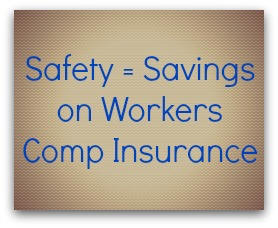Workers’ Compensation Insurance – Worker’s Comp
Workers’ Compensation Insurance
Worker’s Comp
By: Allen Financial Insurance Group
Contact us for a no obligation worker’s compensation insurance quote today
Workers’ Compensation
Allen Financial has been an innovator in developing risk management services that have reduced the incidence and severity of injuries for our client’s employees. We have established a reputation for creating effective safety management and cost control programs for specific business niches. In order to help our customers achieve significant reductions in their insurance costs, our safety and claims professionals have developed an array of innovative and extremely effective training and cost control programs.
What is Workers’ Compensation Insurance?
Workers’ compensation provides benefits to employees for work-related injuries or illnesses including medical care, wages from lost work time, and more. It also provides a deceased workers’ family with a financial benefit. If a workers’ family decides to sue a company, it can also help cover the related legal fees.
Workers’ compensation insurance can help protect your business and employees in events such as these:
- An employee slips on ice, injures himself while walking up the stairs to the office, and requires an emergency room visit and weeks of recovery time.
- An employee injures her back lifting a box of printer paper and requires a doctor’s attention, medication and physical therapy.
- An employee returning to the office from visiting a client is injured in a car accident and requires hospitalization.
With workers’ compensation insurance, AFIG will help pay for the medical expenses needed to treat these job related injuries and illnesses. Workers’ compensation will also help employees keep their income while they take time off to recover.

Workers’ Compensation Insurance Quick Facts
You can turn your Workers’ Comp policy to help pay for employees’ work-related injury or illness expenses, including…
- Medical bills.
- Ongoing care (including medication and rehabilitation).
- Missed wages (often partial) during recovery.
- Funeral expenses for fatal incidents.
- Death benefits to support the deceased’s family.
But it won’t pay for :
- Injuries caused by intoxication or drugs.
- Self-inflicted injuries.
- Injuries from a fight the employee starts.
- Injuries caused by horseplay or company policy violations.
- Off-the-job injuries.
- Injuries claimed after an employee is fired or laid off.
- Independent contractor injuries.
- Wages for a replacement worker.
- OSHA fines.
Who Needs Workers’ Compensation Insurance?
| SMALL BUSINESSES | CONTRACTORS AND FREELANCERS | CONSTRUCTION PROFESSIONALS | |
|---|---|---|---|
| WHO REQUIRES IT? | State laws | State laws | Clients and some state laws |
| WHY DO YOU NEED IT? | Many states require you to carry coverage when you hire your first employee. You could face fines and other penalties for ignoring these rules. | Some clients may require proof of Workers’ Comp coverage to prove to their insurer you’re not an employee. | Some states require solo roofers and other construction contractors to carry coverage for themselves. |

Sample of State Penalties for Workers’ Comp Noncompliance
| STATE | PENALTY |
|---|---|
| California | Up to $10,000 in fines and / or up to a year in jail (the state can also issue penalties of up to $100,000 against illegally uninsured employers). |
| Florida | 2x the amount the employer would have paid in premium within the last two years. |
| Illinois | Up to $500 for every day of noncompliance with a minimum fine of $10,000 |
| New York | Up to $50,000 in fines for employers with more than 5 employees. |
| Virginia | $250 per day for each day of noncompliance, with a maximum penalty of $50,000. |
3 Ways Workers’ Comp Insurance Protects Your Business
Employee Work Illness & Injury Expenses
Workers’ Comp can help pay for medical expenses and missed wages for employees who are hurt on the job. If an employee dies, the policy can cover funeral expenses.
State Law Compliance
Most states require employers to carry Workman’s Compensation Insurance as soon as they hire their first employee.
Employee Injury Lawsuits
If your employee suffers an occupational injury your state doesn’t require Workers’ Comp Insurance to cover, the employee may sue you to recoup medical expenses.
How Much Does Workers’ Compensation Insurance Cost?
Workers’ Compensation Insurance rates vary from state to state. For example, per $100 in employee wages, rates range from $0.75 in Texas to $2.74 in Alaska. Behind those rates are a lot of variables. The cost of Workers’ Compensation depends on:
- Your state.
- Your industry.
- How many employees you have.
- The type of work your employees do.
- Your payroll.
- Your claims history.
The National Safety Council notes [PDF] that the cost of medical expenses for occupational injuries was $198 billion in 2011. As we mentioned earlier, that same study found that the average work injury claim costs about $36,551.

Understanding Your Workers Comp Policy
Usually a workers comp policy has two parts: “Part One, Workers Compensation” and “Part Two, Employers’ Liability.”
Under “Part One”, the insurer contracts to pay whatever the state-required amounts of compensation may be. Unlike other types of insurance, workers comp coverage has no ceiling or limit on the policy amount. The insurance company accepts a transfer of the employer’s entire statutory obligation—whatever the employer is legally obligated to pay as a result of the injury.
“Part Two” of the policy provides coverage for an employer who is sued by an employee for work-related bodily injury or illness that isn’t subject to state statutory benefits. It has a monetary limit.
Employers’ liability also insures an employer in some other situations. One is so-called “third-party over suits,” where an injured worker files suit against someone other than the employer (a third party) and that third party then seeks to hold the employer responsible. For example, an employee injured while working with a machine might file suit against the manufacturer of the machine. The manufacturer might then sue the employer claiming that the cause of the injury was modifications the employer made to the machine or improper use. Another situation where this liability coverage applies is when the spouse of an injured worker sues the employer for loss of consortium.
WHAT CAN I DO TO REDUCE MY WORKERS COMP PREMIUMS?
- Manage Your Risks
- Take Advantage of Saving Opportunities
- Be Sure Your Premium is Correctly Figured
- Raise Your Deductibles
- Try to Avoid Assigned Risk
- Coordinate Disability Programs
Manage Your Risks – Most small companies do not believe they can afford to hire a risk manager. Nevertheless, someone in the company should have a continuing responsibility for loss control and the management of workers comp claims. This involves a variety of programs to keep workers safe, the medical management of claims and early return to work for any injured workers.
In some states insurers must provide accident prevention services to employers. Even if not required to do so by law, the majority of workers comp insurers can help you improve safety. In some states, employers are required by law to set up safety committees and other programs to deal with unsafe conditions in the workplace. Even when not required by law, safety committees can be very effective at reducing accidents. For example, after UPS set up worker safety committees at each of its locations to identify the most frequent workplace accidents and took measures to reduce them, injuries that caused workers to take time off from work decreased by 59 percent.
You may also be legally required to have a written injury and illness prevention program. Again, even if not legally required to do so, having and following a written program can help reduce accidents.
Take Advantage of Savings Available in Your State – Several states allow merit rating credits. Smaller businesses that typically pay $5,000 in premiums or less may be entitled to a credit of 5 to 15 percent if they have not had any lost-work-time claims during a designated period. In some states there are premium credits for drug- and alcohol-free workplace programs and safety programs. Some insurers may give you a discount if you hire a professional risk management firm to help you with your safety program.
Be Sure Your Premium Is Figured Correctly – Make sure you have been placed in the right industry category. Check that the insurer’s payroll computation adjusts for overtime pay and allocates the payroll of different employees correctly.
Raise Your Deductibles – A majority of states provide for optional medical deductibles in workers comp insurance policies as a cost saving measure. Deductibles tend to encourage greater safety consciousness on the part of the employer who must pay the deductible amount.
Try to Avoid Assigned Risk – Cutting down on your claims is the best way to stay out of the state’s assigned risk plan, or insurer of last resort, which usually costs more. You may have been put into assigned risk without knowing it. Ask your agent to check on your status.
If you have been put in assigned risk, find out from your state workers comp agency if rates are higher. If they are, make a concerted effort to get other insurance. Just because one agent is unable to find something better for you doesn’t necessarily mean that it doesn’t exist. Talk with other agents, investigate group self insurance programs that may be available in your state and talk with other people in your industry and owners of other businesses of similar size and age and with a similar risk level.
Coordinate Disability Programs – This option isn’t available everywhere, but in some states businesses are trying to bring costs under control through the coordination of workers compensation, health care and disability benefit plans. The integration of workers compensation and other employee benefit programs is a broad concept that ranges from a simple marketing approach that promises savings from using the same insurer for both coverages to programs that offer a managed care approach to the management of all types of disability, regardless of whether they are work-related.
Besides limiting overlapping programs and streamlining administration, proponents say the change to a broad approach addresses the increasing difficulty of distinguishing between work- and nonwork-related injuries and illnesses, such as injuries due to repetitive motion and mental stress claims. It improves productivity, since nonwork-related disabilities are managed with the same focus of getting the employees back to work as work-related cases.
Employee v. Contractor
The Internal Revenue Service
These are the 20 criteria used by the Internal Revenue Service to determine whether an individual should be treated as an Employee or an Independent Contractor. On the checklist below, affirmatives indicate Employee status, and negatives indicate Independent Contractor status. The IRS may not agree with evaluations based on this checklist. It may give overriding weight to one or two factors, tipping its evaluation in one direction.
This checklist will only give an indication of how the IRS would evaluate a situation. Before making a final determination, you should consult your accountant
- The individual must comply with instructions as to when and how work is performed.
- The individual is trained to perform the work in a particular method or manner.
- The individual’s services are integrated into the operations of the employer’s business.
- The individual must render the services personally.
- The employer hires, supervises and/or pays the individual’s assistants.
- There is a continuing relationship between the individual and the employer.
- The hours of work are set by the employer.
- The employer directs the order in which the work must be done.
- The individual is required to devote full time to the employer.
- The work is performed at the employer’s place of business.
- Regular oral or written reports are required.
- Hourly, daily or weekly compensation is paid.
- Business or travel expenses are reimbursed.
- The employer furnishes tools and materials used in providing the service.
- The individual has no significant investment in the facilities used.
- The individual can realize only a profit.
- The individual is restricted from working for other firms at the same time.
- The individual is restricted from making services available to the general public.
- The individual is protected from dismissal for reasons other than breach of contract.
- If the individual terminates the relationship before a job is completed, he or she is liable.


